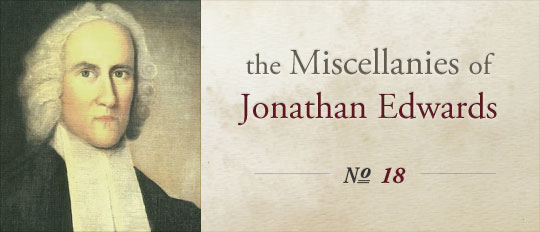
Paul tells us that "in Adam all die" (1 Corinthians 15:22). How can this be? How can all humanity be counted guilty for one man's sin? Maybe the more relevant question is, How can I be found guilty for another man's sin?
If you are like me, you have struggled to own this difficult but very important doctrine of imputed sin. Edwards gives us some help in his Miscellanies #18.
It is no more unreasonable that we should be guilty of Adam's first sin, than that we should be guilty of our own that we have been guilty of in times past. For we are not the same we were in times past, any other way than only as we please to call ourselves the same.
For we are anew created every moment; and that that is caused to be this moment, is not the same that was caused to be the last moment, only as there is such a relation between this existence now and a certain existence in time past as we call sameness; such as remembrance, consciousness, love, likeness, a continuation of being both as to time and place without interval, etc.: which relations the sovereign God has constituted stated conditions of derivations of guilt. What relations he will constitute to be such conditions, is entirely at his will and pleasure.
In order to understand this Miscellany we need to understand what Edwards means by his statement, "we are anew created every moment." This is a reference to his belief that existence is a continual act of creation. In other words, God is creating everything "ex nihilo" every moment.
In his sermon "God Is Everywhere Present," Edwards unpacks this idea:
The same power that made things to be, that first moment that ever they were, is now exercised to make them to be this moment and is continually exercised to make them to be every moment that they are. God’s preservation of the world is nothing but a continued act of creation…
Whenever a body moves or a spirit thinks or wills, it is the infinite power and wisdom that assists it. God has established the laws of nature, and he maintains them by his continual influence… When we see the sun shine, we see God’s present operation and that which is the effect of his former operation but that is from his immediate influence every moment... Whenever there are any natural actions or motions in things with life or without life, then God is present by his operation…
So if we look upon ourselves and see our hands or feet and the members, these have an existence because God is there and by an act of infinite power upholds them.
To Edwards, the rising of the sun every morning shows the consistency and faithfulness of God and not a self contained order of things. God exerts his infinite power to sustain the sun and spin the earth every moment.
In light of God's continual creation ex nihilo, in Miscellanies 18 Edwards explains that I am a different creature than I was a moment ago, in a certain sense. I have different thoughts and different chemical reactions firing in my brain. I am even made up of different cells, being newly created and sustained in this moment by the power of God, just as when I first came into being. What I did ten minutes ago I might not do again if I had the opportunity.
Why then am I guilty for the sins I committed yesterday? The answer to this question is the same as the answer to the question, Why am I guilty for the sin of Adam?
Because God designed it so. God has made a connection between the you of today and the you of yesterday, such that you are guilty for the sin you committed yesterday. God has also made a connection between us and our first ancestor, such that his sin is imputed to our account.
The good news is that God also designed it that "by one man's obedience the many will be made righteous" (Romans 5:19). Just as the guilt of Adam is counted towards all of humanity, so the righteousness of Christ is counted towards all who trust in him.
No comments:
Post a Comment